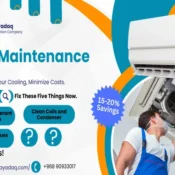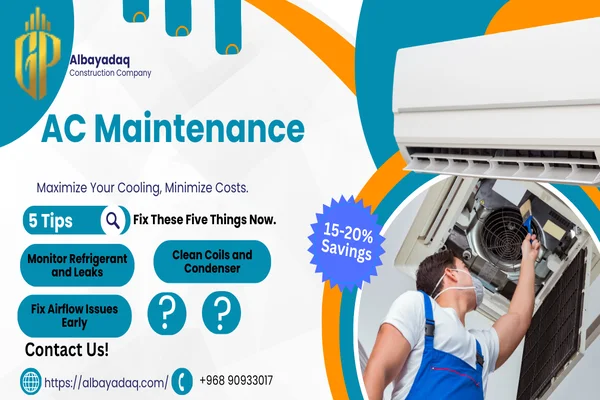
AC Maintenance 5 Tips That Cut Energy Bills and Extend Lifespan
AC Maintenance matters more than most homeowners realize. Regular care cuts bills, prevents breakdowns, and extends unit life. This guide gives five smart, actionable AC maintenance steps you can use now, a simple checklist, pro signals to watch for, cost expectations, and when to call a technician. It’s written so an 8th-grade reader can follow each step and so landlords and property managers get the documentation they need.
Why AC Maintenance matters now
Air Conditioner maintenance keeps your home cool, improves energy efficiency, and prevents sudden failures when heat is worst. Regular service addresses common problems like clogged filters, low refrigerant, and dirty coils that raise energy use and wear on the compressor. Industry checklists and standards recommend regular inspections and preventive servicing to maintain performance. See ENERGY STAR’s checklist for core maintenance items.
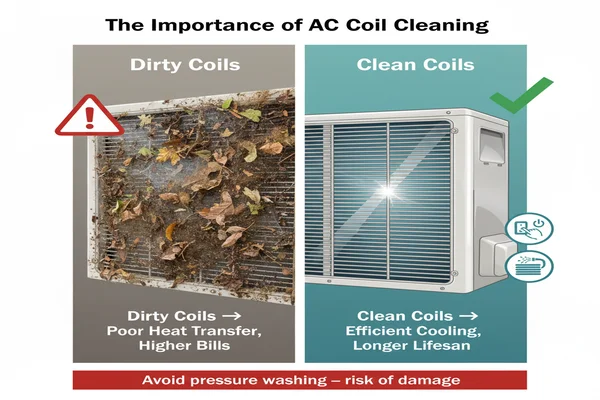
Table of Contents
The 5 Smart AC Maintenance Tips (actionable)
Tip 1. Start with a regular maintenance checklist (weekly/monthly/annual)
Create a simple maintenance schedule and follow it. Include: AC filter replacement, visual condenser cleaning, test thermostat, and inspect for leaks.
Monthly: Check and replace AC filter replacement if dirty.
Quarterly: Clear debris around outdoor unit; inspect condensate drain.
Annually: Professional air conditioner servicing and AC tune-up (spring is ideal). Industry pros recommend a tune-up before the heavy cooling season.
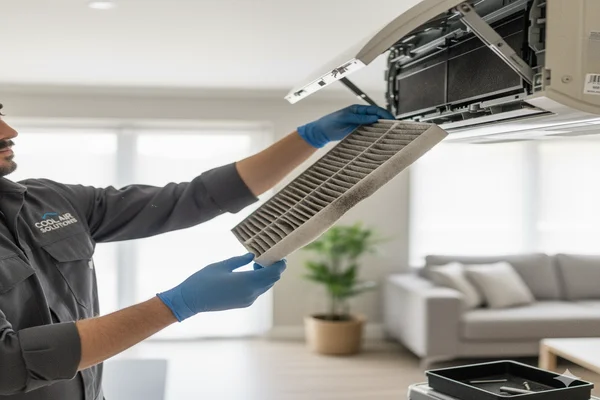
Checklist
- AC filter replacement every 1–3 months.
- Clear 1m radius around outdoor unit.
- Inspect condensate drain for blockages.
- Check thermostat calibration.
- Book professional AC maintenance once a year or per manufacturer.
Tip 2. Keep coils and condenser clean (avoid efficiency loss)
Dirty coils reduce heat transfer. Clean the condenser and inspect evaporator coils. For safe DIY: switch power off, gently hose (not pressure-wash) the outdoor coil, and remove large debris. For deep cleaning, book an AC cleaning service or checklisted professional visit. Cleaning condenser & evaporator coils is a must for salty/humid climates to avoid corrosion and reduced cooling.
Tip 3. Monitor refrigerant and leaks (AC gas refill & leak detection)
If your AC is blowing warm air, a likely cause is low refrigerant or a leak. Avoid DIY refrigerant top-ups. Technician steps: AC leak detection, pressure test, repair leak, then AC gas refill to spec. Always use licensed services for refrigerant handling.
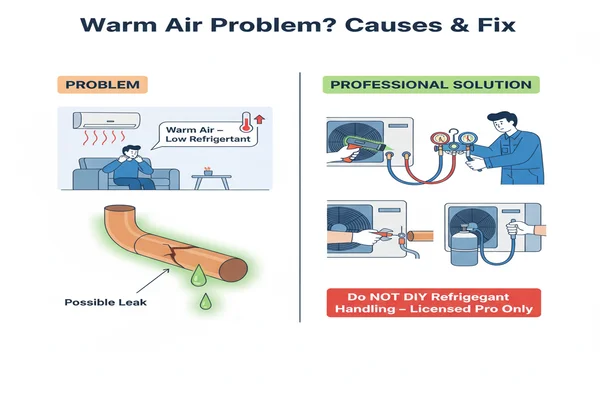
Tip 4. Fix airflow & electrical issues early (prevent big repairs)
Poor airflow from clogged return vents or failed fans reduces performance. Inspect vent registers, replace filters (clogged filters effect on cooling), and check the outdoor fan. Tighten electrical connections and inspect the capacitor and motor. For noisy AC troubleshooting or AC fan motor repair, call a pro. Electrical failures are safety risks; do not work on mains wiring yourself.
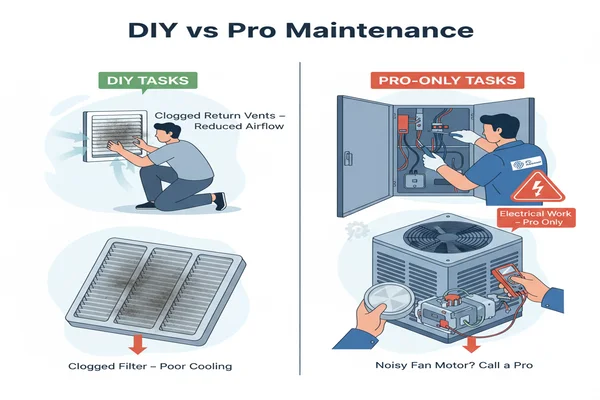
Tip 5. Use seasonal scheduling & energy checks
Adopt a seasonal maintenance schedule. Tune-up before summer. A spring visit reduces emergency calls and may lower energy bills. Track utility bills; sudden spike may indicate performance degradation signs or a refrigerant problem. ENERGY STAR and HVAC pros recommend scheduled service to avoid breakdowns during peak heat.
DIY vs Hire a Pro: what you can do and what you should not
DIY maintenance tasks: filter replacement, clearing debris, checking thermostat settings, and light coil cleaning.
Hire a professional for refrigerant diagnosis, electrical repairs, compressor issues, or complex fan motor work. Use licensed technicians for AC gas refill and refrigerant level check. For compliance with standards consult ASHRAE guidance.
When to call now (emergency): water leakage, smoke or burning smell, loud grinding noises, no cooling despite fan running — call emergency AC repair immediately.
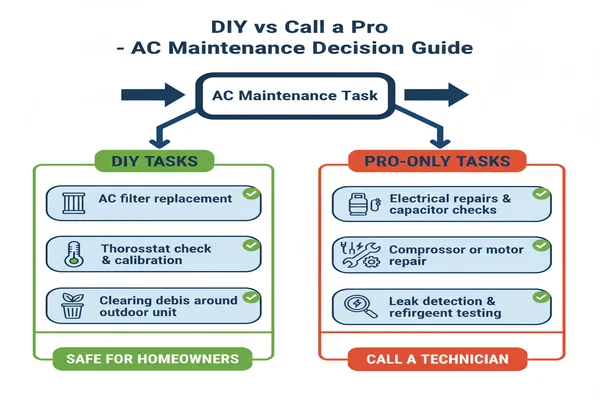
Estimated costs & value: what to expect
- Basic preventive visit / AC tune-up: low to mid-range. Covers filter checks, coil inspection, refrigerant check, thermostat test.
- Gas refill or leak repair: variable depending on severity and refrigerant type.
- Major parts (compressor, coil): significant; preventive care reduces frequency.
Local providers in Muscat show packages and AMCs. Compare quotes, ask for inspection reports, and request warranties on work. (Local examples: Stalwart FM, Stars AC).
Quick troubleshooting guide
| Symptom | What it often means | Quick fix |
|---|---|---|
| Weak cooling | Low refrigerant, dirty coils, clogged filter | Replace filter, clear debris, call pro if persists |
| Water leaking indoors | Blocked condensate drain or frozen coil | Clear drain line; call pro for frozen coil |
| Loud noise | Fan/motor issue, loose part | Turn off unit, call for noisy AC troubleshooting |
| High energy bill | Poor efficiency, dirty system | AC performance optimization, clean coils, check settings |
Al Bayadaq field note (experience)
When Al Bayadaq technicians perform Maintenance visits, common wins are restored airflow, 10–18% energy drop, and fewer emergency calls in summer. Typical fixes: AC filter replacement, cleaning condenser fins, tightening electrical connections.
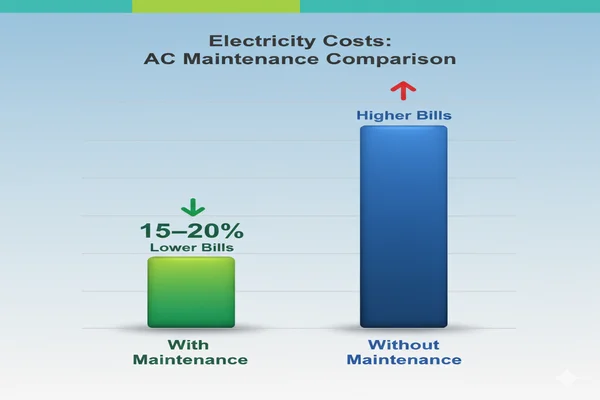
FAQs
Q1: What is AC maintenance and why is it important?
AC maintenance is routine care for your air conditioner to ensure proper cooling, energy efficiency, and longer equipment life. It prevents breakdowns and lowers bills.
Q2: How often should I schedule AC maintenance?
Schedule AC maintenance annually for basic systems and twice yearly for heavy-use climates. Follow the seasonal maintenance schedule for best results.
Q3: Can I do AC maintenance myself?
You can perform simple AC maintenance tasks (filter changes, clearing debris). For refrigerant, electrical, or compressor work, use a professional.
Q4: How much does AC maintenance cost?
AC maintenance costs vary. Basic tune-ups are affordable; leak repair or compressor replacement costs more. Request itemized quotes.
Q5: Does AC maintenance save energy?
Yes. Regular AC maintenance improves efficiency and can reduce electricity usage significantly by cleaning coils and replacing filters.
Q6: What are signs my AC needs maintenance?
Signs include reduced cooling, unusual noises, leaks, higher bills, and odd smells. These indicate AC maintenance is overdue.
Q7: Is AC maintenance necessary in humid coastal climates?
Absolutely. Humidity and salt air accelerate coil fouling and corrosion so specialized AC maintenance and corrosion-aware cleaning are essential.
Q8: What should a professional AC maintenance service include?
A professional AC maintenance visit typically inspects electricals, checks refrigerant, cleans coils, replaces filters, tests thermostat, and issues a report.


